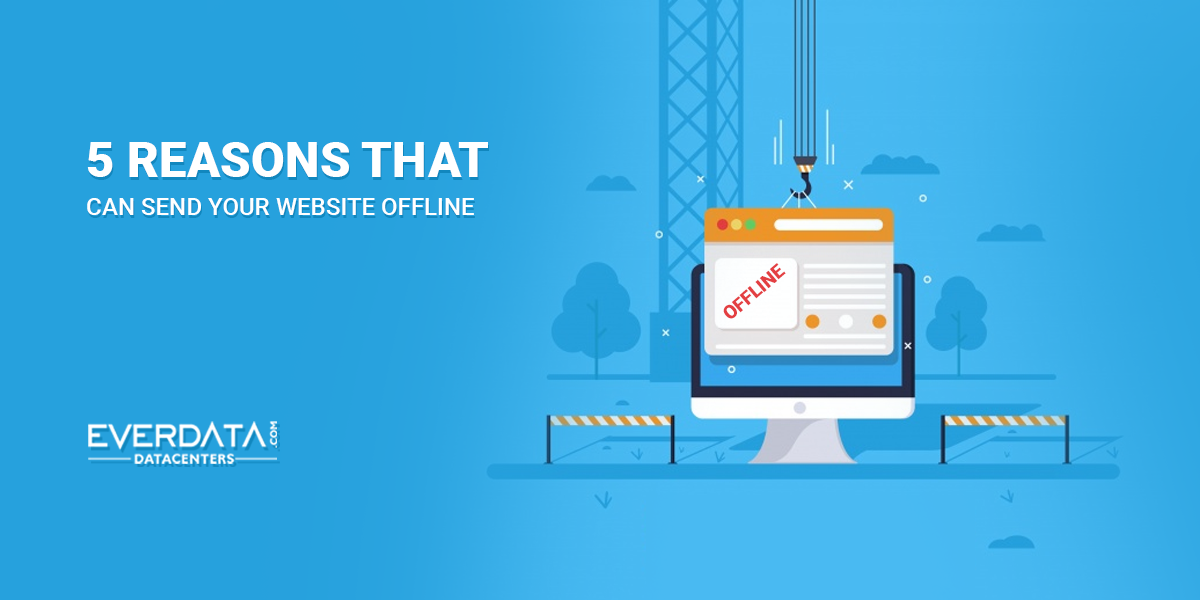
Submitted by Omkar on

One of the biggest nightmares for any website owner is experiencing unexpected downtime. A website going offline can happen for various reasons, but the impact on your digital business can be severe, especially if the downtime occurs during peak hours or high-traffic seasons. The longer your site remains inaccessible, the greater the potential loss. That’s why it’s crucial to take proactive steps to prevent such situations. In this article, we’ll explore the most common causes of website downtime and how to address them effectively.
Making Undesired Changes to Coding
Your website is run by complex programming languages/scripts like C, C++, JavaScript, PHP, ASP.Net etc. It would not be an exaggeration to say that many of these programming languages act as the delicate foundation for your digital real estate, i.e., your website.
-
So, if any change is made in the coding of these languages by an unauthorized entity (intentionally) or an inexperienced programmer (unintentionally), it can massively hurt your website and as a result your site might even crumble down.
-
In many cases the users of WordPress can experience offline issues due to misalignment of code associated with a template or a plug-in.
Server Maintenance by your hosting company
A web hosting company makes use of a number of software and hardware resources in order to run your website and these resources, platforms or infrastructure elements need regular maintenance to ensure that the things should work smoothly and in the desired manner. So, just like your car, AC or two-wheeler, they also need to go for periodical maintenance service.
-
For that matter the hosting companies need to take the websites down temporarily while they carry on the server maintenance services.
-
Most of the reputed hosting companies try their best to schedule the maintenance during quiet business hours to minimize the loss. However, due to the long list of clients doing different businesses and residing in different geographical areas with different time zones, it is not possible to guarantee every client that their business will not be affected during the offline sessions.
-
On the positive side, each time the server maintenance exercise is successfully completed your site gets a better platform that can add to its performance and speed, and enhance the overall user experience.

Unmanageable site traffic
Increased site traffic is always a good thing. However you need to ensure that your hosting provider offers you the comfortable amount of resources that can easily manage the expected or unexpected influx of traffic.
-
Viral content can drive tons of traffic to your site but on the flip side, if your site does not have the adequate resources or ecosystem to handle that much amount of traffic then your site can crash.
-
So, if you are planning to exercise any popular methods to bring heavy traffic to your site then it is recommendable to discuss the things with your web hosting provider beforehand to ensure that your site won't crash.
Shared hosting issues
While the above situation might be handled to a certain extent by acting at the right time, there is another instance of increased traffic that could be more difficult to manage. You may be aware that when you buy shared hosting plans, your website will be hosted on the same physical server that houses tons of other sites and all the sites share the common resource pool.
-
So, if your neighbor site experiences a traffic influx then it will absorb more resources to tackle that traffic and in the process, a huge part of the resources powering your site can be pulled by your neighbor site. As a result your site can get offline.
Hackers’ trick
All the instances of huge traffic are not pleasant or desirable. Many times the smart hackers can instruct the spam bots to send massive and unmanageable traffic to your website with an intention to make it go offline. But why?
-
The answer is simple, they want to take unauthorized and fully extended control of your website by making a backdoor entry and the things are technically more complicated if not outright impossible for them when your site is live and running.
-
So they send your site offline to facilitate their malicious hacking endeavours.
Keep in mind…
Hit and Try can hurt your site
One of the major mistakes made by the clients during the offline issues is that they start “hit and try” operations to bring their sites online again. It can include checking the script or coding or going through other technical processes. In most of the cases, it is a futile exercise until or unless you are an expert (means a Real, certified expert) at web hosting technologies. In any case, you risk doing some permanent damage to your site. So better avoid any hit and try exercise.
Contact the customer service
The first thing (and most probably the only thing) is to contact the customer care department of your hosting provider and let them tackle the issue. Most of the reputed hosting companies offer 24X7 customer services that can be reached via various communication mediums. You may open the ticket, contact via email or directly call them up. The last option is ideally recommendable in case if your site goes offline.
Inform you audience
The next step should be to inform your visitors and clients about the issue via social media platforms or emails and if possible also specify the time when your site is expected to be up and running again. Avoid giving any assurance though, as you never know if it can take longer than the expected period of time. Don’t forget to inform them once your site comes online.


Add new comment